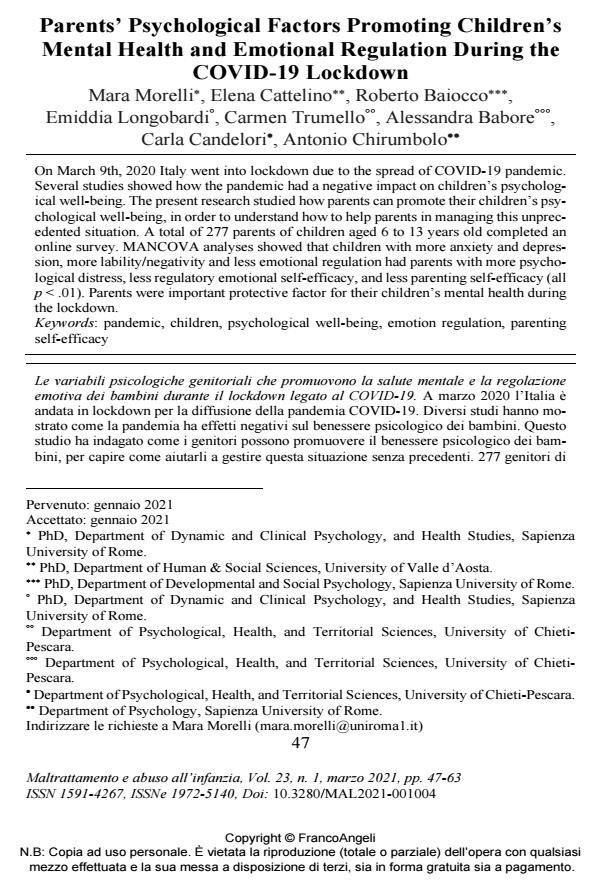Parents’ Psychological Factors Promoting Children’s Mental Health and Emotional Regulation During the COVID-19 Lockdown
Journal title MALTRATTAMENTO E ABUSO ALL’INFANZIA
Author/s Mara Morelli, Elena Cattelino, Roberto Baiocco, Emiddia Longobardi, Carmen Trumello, Alessandra Babore, Carla Candelori, Antonio Chirumbolo
Publishing Year 2021 Issue 2021/1
Language English Pages 17 P. 47-63 File size 205 KB
DOI 10.3280/MAL2021-001004
DOI is like a bar code for intellectual property: to have more infomation
click here
Below, you can see the article first page
If you want to buy this article in PDF format, you can do it, following the instructions to buy download credits

FrancoAngeli is member of Publishers International Linking Association, Inc (PILA), a not-for-profit association which run the CrossRef service enabling links to and from online scholarly content.
On March 9th, 2020 Italy went into lockdown due to the spread of COVID-19 pandemic. Several studies showed how the pandemic had a negative impact on children’s psychologi-cal well-being. The present research studied how parents can promote their children’s psy-chological well-being, in order to understand how to help parents in managing this unprec-edented situation. A total of 277 parents of children aged 6 to 13 years old completed an online survey. MANCOVA analyses showed that children with more anxiety and depres-sion, more lability/negativity and less emotional regulation had parents with more psycho-logical distress, less regulatory emotional self-efficacy, and less parenting self-efficacy (all p < .01). Parents were important protective factor for their children’s mental health during the lockdown.
Keywords: Pandemic, children, psychological well-being, emotion regulation, parenting self-efficacy
- Mapping autism’s research landscape: trends in autism screening and its alignment with sustainable development goals Prema Nedungadi, Selina Marianna Shah, Mark Andrew Stokes, Vinith Kumar Nair, Ajit Moorkoth, Raghu Raman, in Frontiers in Psychiatry 1294254/2024
DOI: 10.3389/fpsyt.2023.1294254 - L'impatto della paura da COVID-19 sui livelli di stress e sui sintomi di ansia e depressione in adolescenti Maria Giuseppina Bartolo, Anna Lisa Palermiti, Rocco Servidio, Flaviana Tenuta, Francesco Craig, Angela Costabile, in MALTRATTAMENTO E ABUSO ALL'INFANZIA 2/2021 pp.47
DOI: 10.3280/MAL2021-002004 - Self-efficacy, subjective well-being and positive coping in adolescents with regard to Covid-19 lockdown Elena Cattelino, Silvia Testa, Emanuela Calandri, Angela Fedi, Silvia Gattino, Federica Graziano, Chiara Rollero, Tatiana Begotti, in Current Psychology /2023 pp.17304
DOI: 10.1007/s12144-021-01965-4 - Parental Mediation of COVID-19 News and Children’s Emotion Regulation during Lockdown Mara Morelli, Federica Graziano, Antonio Chirumbolo, Roberto Baiocco, Emiddia Longobardi, Carmen Trumello, Alessandra Babore, Elena Cattelino, in Journal of Child and Family Studies /2022 pp.1522
DOI: 10.1007/s10826-022-02266-5 - The effect of perceived stress on life satisfaction among Chinese adolescents during COVID-19 pandemic: the chain mediating role of self-efficacy and meaning in life Chen Xu, Lingxin Liu, Wanyan Fu, Jingxing Wu, Peng Li, Min Li, in BMC Public Health 104/2025
DOI: 10.1186/s12889-025-25604-w - Mothers’ and Children’s Mental Health During the COVID-19 Pandemic Lockdown: The Mediating Role of Parenting Stress Alessandra Babore, Carmen Trumello, Lucia Lombardi, Carla Candelori, Antonio Chirumbolo, Elena Cattelino, Roberto Baiocco, Sonia Monique Bramanti, Maria Luisa Viceconti, Silvia Pignataro, Mara Morelli, in Child Psychiatry & Human Development /2023 pp.134
DOI: 10.1007/s10578-021-01230-6 - Disagio psichico e sociale in genitori e bambini 0-6 anni durante la pandemia da COVID-19: conseguenze emotive e comportamentali tra lockdown e post-lockdown Angelica Arace, Donatella Scarzello, Paola Zonca, Protima Agostini, in MALTRATTAMENTO E ABUSO ALL'INFANZIA 2/2021 pp.11
DOI: 10.3280/MAL2021-002002 - Relationship between parents’ anxiety, stress, depression and their children’s health-related quality of life and psychological well-being during the COVID-19 outbreak in Iran Tao Liang, Mahlagha Dehghan, Yaser Soltanmoradi, Precious Chibuike Chukwuere, Hassan Pakdaman, Elham khaloobagheri, Mahmood Kahnooji, Seyedhamid Seyedbagheri, Mohammad Ali Zakeri, in BMJ Paediatrics Open /2024 pp.e002318
DOI: 10.1136/bmjpo-2023-002318 - The impact of economic crisis on the mental health of children and adolescents: A systematic review Rita Feghali, Charline El-Hachem, Georges Bakhos, Myriam Zarzour, Rami Bou Khalil, in Asian Journal of Psychiatry 104613/2025 pp.104613
DOI: 10.1016/j.ajp.2025.104613 - The impact of routines on emotional and behavioural difficulties in children and on parental anxiety during COVID-19 Vera Lees, Rosie Hay, Helen Bould, Alex S. F. Kwong, Daniel Major-Smith, Daphne Kounali, Rebecca M. Pearson, in Frontiers in Child and Adolescent Psychiatry 1114850/2023
DOI: 10.3389/frcha.2023.1114850 - Supporting Early Childhood During the COVID-19 Pandemic Between Crisis and Care: Emotional and Educational Challenges for Immigrant Mothers and ECEC Services in Italy Angelica Arace, Donatella Scarzello, Laura Elvira Prino, Paola Zonca, in Education Sciences /2025 pp.1149
DOI: 10.3390/educsci15091149 - Preschool Emotional Problems in the Post-Pandemic Era between Parental Risk and Protective Factors Laura Elvira Prino, Angelica Arace, Paola Zonca, Protima Agostini, Donatella Scarzello, in Healthcare /2023 pp.2862
DOI: 10.3390/healthcare11212862 - Comparing parental distress and children’s difficulties between parents of children with rheumatic diseases and parents of healthy children in families facing the COVID-19 pandemic Sonia M. Bramanti, Valerio Manippa, Alessandra Babore, Anna Dilillo, Alessia Marcellino, Vanessa Martucci, Saverio Mallardo, Sara Isoldi, Silvia Bloise, Mariateresa Sanseviero, Donatella Iorfida, Enrica De Luca, Carmen Trumello, Francesca D’Alleva, Flavia Ventriglia, Riccardo Lubrano, Emanuela Del Giudice, in Current Psychology /2023 pp.20114
DOI: 10.1007/s12144-022-03589-8 - Experience of psychological problems in crisis events: how does social support affect teenagers’ psychological security through emotion during the COVID-19 pandemic? Chenchen Pan, Dingming Wang, in Asia Pacific Journal of Education /2024 pp.1
DOI: 10.1080/02188791.2024.2379500
Mara Morelli, Elena Cattelino, Roberto Baiocco, Emiddia Longobardi, Carmen Trumello, Alessandra Babore, Carla Candelori, Antonio Chirumbolo, Parents’ Psychological Factors Promoting Children’s Mental Health and Emotional Regulation During the COVID-19 Lockdown in "MALTRATTAMENTO E ABUSO ALL’INFANZIA" 1/2021, pp 47-63, DOI: 10.3280/MAL2021-001004